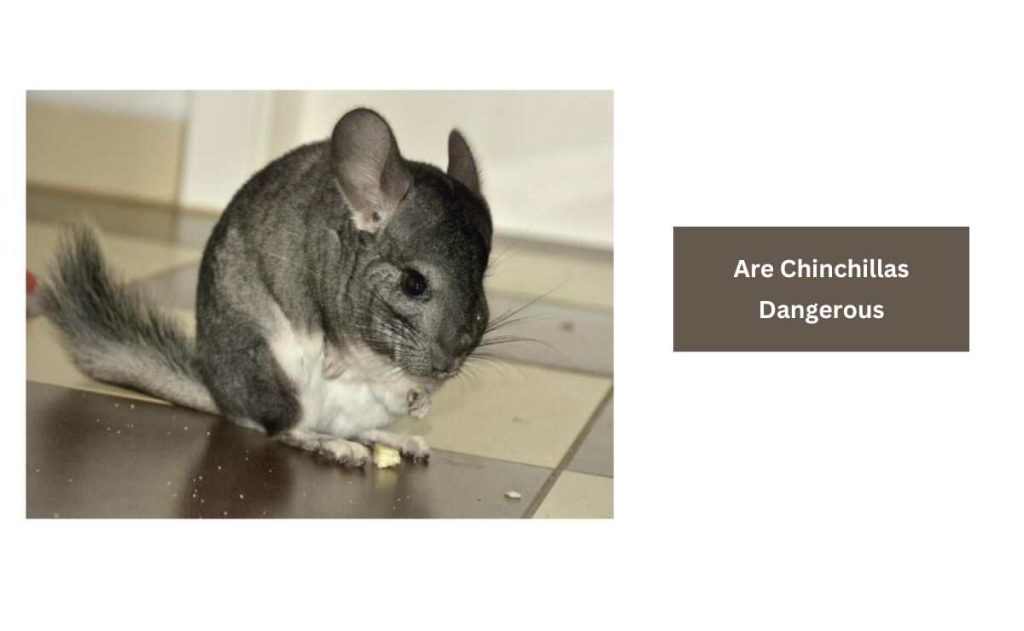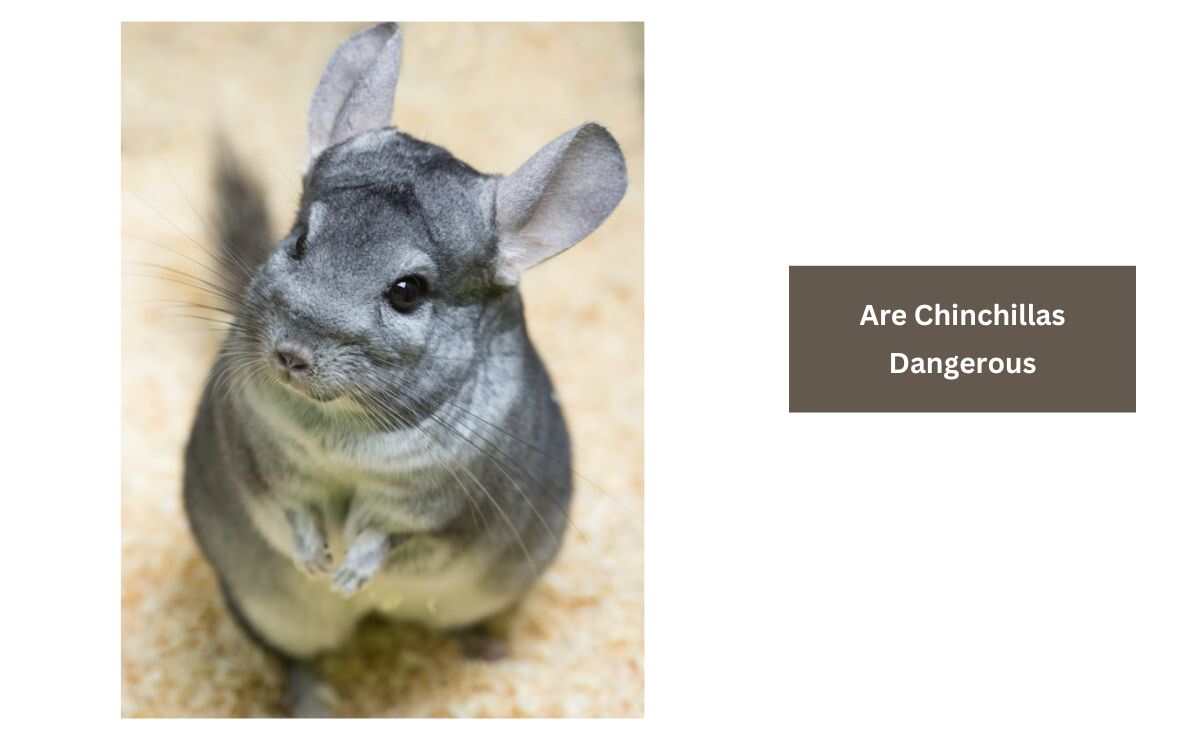Chinchillas, with their adorable fluffy coats and playful personalities, have become increasingly popular as pets in recent years. As more people add these charming little rodents to their households, it’s natural for concerns about their potential dangers to arise.
Are chinchillas dangerous? This question is often asked by prospective or current chinchilla owners who want to ensure the safety of themselves and their families.
In this article, we will explore various aspects of chinchilla behavior and biology to shed light on any potential risks they may pose. By understanding the nature of these fascinating creatures, chinchilla owners can make informed decisions regarding their care and create a safe environment for both themselves and their beloved pets.
Are Chinchillas Dangerous?

Chinchillas are generally not considered dangerous animals. They are small, gentle creatures that make popular pets due to their friendly nature and low maintenance requirements. However, like any animal, they have certain behaviors and characteristics that owners should be aware of.
One potential concern with chinchillas is their tendency to bite if they feel threatened or scared. This is a natural defense mechanism for them, but it can be avoided by handling them gently and providing a calm environment. It’s also important to note that chinchillas have delicate bones, so rough handling or dropping them can cause injury.
Another consideration is their chewing habit. Chinchillas have constantly growing teeth, so they need appropriate chew toys and materials to keep their teeth in good condition. If not provided with suitable items, they may chew on furniture or electrical cords, which can pose a danger to both themselves and your home.
While chinchillas are generally safe animals to keep as pets, it’s important for owners to educate themselves about their needs and behaviors in order to ensure a safe and happy environment for both the chinchilla and themselves.
Do Chinchillas Get Aggressive?
Chinchillas are generally known for their docile and friendly nature. However, like any other animal, they can display aggression under certain circumstances. It is important to understand the reasons behind their aggression and how to handle it appropriately.
One common cause of aggression in chinchillas is territorial behavior. Chinchillas can become aggressive if they feel their space is being invaded or if they perceive a threat to their territory. This can happen when introducing a new chinchilla into their living environment or when handling them without proper care and respect for their personal space.
Another factor that can contribute to chinchilla aggression is fear or stress. Chinchillas are prey animals by nature, so they may react aggressively when they feel threatened or cornered. It is crucial to create a calm and secure environment for your chinchilla, providing them with plenty of hiding spots and minimizing potential stressors such as loud noises or sudden movements.
While chinchillas are generally gentle creatures, they can exhibit aggression in certain situations. Understanding the causes of their aggression and taking appropriate measures to prevent or address it can help ensure a harmonious relationship with your furry friend.
Do Chinchillas Bite?
Yes, chinchillas have the potential to bite. However, it is important to note that not all chinchillas will bite, and biting behavior can vary from one individual to another. Chinchillas may bite for various reasons, including fear, stress, territoriality, or feeling threatened. It is their natural defense mechanism and a way of communicating their discomfort or displeasure.
Chinchillas have sharp teeth that continuously grow throughout their lives, so they may also nibble or chew on objects as a way to wear down their teeth. This behavior is known as chewing rather than biting.
To minimize the chances of being bitten by a chinchilla, it is essential to handle them gently and provide them with proper socialization and environmental enrichment. Additionally, providing appropriate chew toys can help satisfy their natural chewing instincts and prevent them from nibbling on inappropriate items.
When Does A Chinchilla Get Angry?
A chinchilla may exhibit signs of anger or aggression in certain situations. It is important to understand that each chinchilla has its own unique personality, and what may trigger anger in one chinchilla may not necessarily affect another in the same way. However, there are some common scenarios that can lead to a chinchilla getting angry.
One common trigger for anger in chinchillas is feeling threatened or cornered. Chinchillas are prey animals by nature, so when they feel trapped or unsafe, they may display aggressive behavior as a means of self-defense. This can include biting, scratching, or lunging towards perceived threats.
Another factor that can contribute to a chinchilla’s anger is territoriality. Chinchillas are known to be possessive of their belongings and living space. If they feel their territory is being invaded by another animal or even a human, they may become defensive and show signs of anger. It is important to respect their boundaries and provide them with a safe and secure environment to minimize the chances of triggering their aggression.
Understanding your chinchilla’s individual triggers for anger and providing them with a calm and stress-free environment can go a long way in preventing any outbursts of aggression. Regular socialization, proper handling techniques, and creating a comfortable living space for your pet are key factors in maintaining their emotional well-being.
How to Befriend A New Chinchilla?
Befriending a new chinchilla requires patience, time, and a gentle approach. Chinchillas are naturally shy and cautious animals, so it’s important to create a calm and safe environment for them to feel comfortable in. Start by giving your chinchilla some space and allowing them to explore their new surroundings at their own pace.
To begin the bonding process, spend time near your chinchilla’s cage without trying to handle or touch them. Talk softly to them and offer treats or small pieces of their favorite food through the cage bars. This will help them associate your presence with positive experiences.
Once your chinchilla becomes more comfortable with your presence, you can try offering treats from your hand inside the cage. Make sure to move slowly and avoid sudden movements that might startle them. Over time, gradually increase physical contact by gently stroking their fur or scratching behind their ears when they seem relaxed.
Remember that each chinchilla is unique and may require different amounts of time to warm up to you. It’s essential to respect their boundaries and not force interactions if they’re not ready. With patience and consistency, you can build a trusting relationship with your new chinchilla over time.
Conclusion
While chinchillas may possess certain behaviors and characteristics that could be perceived as dangerous, they are generally not a threat to humans when properly cared for and handled. It is important to remember that every animal has its own unique temperament, so it is crucial to do thorough research and consult with experts before deciding to bring a chinchilla into your home.
By providing them with a suitable environment, regular veterinary care, and proper handling techniques, the risk of any potential danger can be minimized. Chinchillas can make wonderful pets for those who are willing to invest the time and effort into their care.
Related Posts
